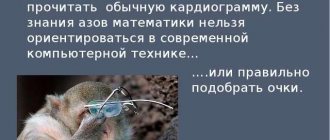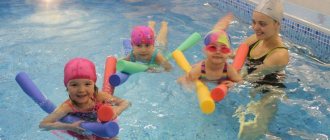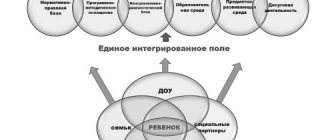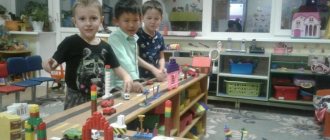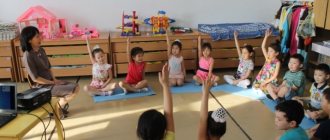Consultations for educators
The section provides consultations for kindergarten teachers on various topics, author's recommendations and consultations for kindergarten teachers. By attending kindergarten, a child should gain a lot of knowledge, important skills and abilities should be formed, and he should receive harmonious development.
It is known that one of the characteristics of preschool children is that a child can solve these problems, learn, develop, only if he experiences positive emotions from being in kindergarten, i.e. psychological comfort. Very warm, affectionate communication between the teacher and the children during the reception (hug, caress, say something very pleasant).
In the section of the site, consultations for kindergarten teachers for different groups contain many interesting publications for teachers on teaching children on various topics:
- Cultivating tolerance in preschool children. Tips for a teacher
- Test for a young teacher
- Testoplasty as a means of enriching vocabulary in children of senior preschool age
- Child development at an early age
- The role of the teacher in the child’s adaptation to kindergarten
- Consultation for educators “Children need fairy tales”
- Development of fine motor skills in children in kindergarten with general speech underdevelopment
- Consultation for preschool teachers “Designing a pedagogical project”
- How to work on a project?
- Fine motor skills in preschool children
- Art therapy techniques that help relieve nervous tension and connect the internal reserves of the child’s body
- Methodology for conducting educational activities in the educational field “Social and communicative development”
- Implementation of a system-activity approach in the cognitive development of children of primary preschool age
- Developmental principles in working with preschoolers
- Work of a teacher with parents on the prevention of child abuse
- Interaction between an additional education teacher and a teacher in the process of teaching the native language
- Rules of conduct and communication for teachers in preschool educational institutions
- Work plan for a teacher during the inter-certification period for five years
- Consultation for kindergarten teachers “Nurturing a child’s personality through work”
- Consultation for preschool teachers “A new look at parent meetings”
- Development of elementary logical thinking in children of senior preschool age
- Consultation for educators “Organizing and conducting experiments with preschoolers. Contents of experimental activity corners"
- Consultation for a teacher: first aid for poisoning with poisonous mushrooms
- The role and task of a kindergarten teacher
- Main directions for developing social relationship skills in preschool children
- Memo for teachers of the Federal State Educational Standard
- Gender education of preschool children
- Problems of continuity between kindergarten and school. Ways to solve them
- Consultation for kindergarten teachers “From fine art activities to creativity”
- Consultation for educators “Teaching solving problems using ingenuity (puzzles)”
Section for kindergarten teachers. The pages of the section contain materials necessary in the daily work of teachers of preschool educational institutions.
A kindergarten teacher looks after children while their parents are at work, but the list of functions of this specialist does not end there: he conducts educational classes, teaches the basics of reading, mathematics, teaches modeling, appliqué, drawing, music and dance, and also does physical education. The teacher-educator gives the child the first ideas about the world around him, the principles of relationships between people, helps him adapt and socialize, teaches him to distinguish good from bad, and explains the rules of behavior in society.
The consultation section for educators is intended for managers, deputy heads, senior educators, educators, kindergarten specialists, parents and those simply interested in raising children.
Methodological consultation for a beginning teacher: structure and content
Methodological consultation for a novice teacher:
structure and content
Egorova Alla Vladimirovna,
primary school teacher,
Deputy Director for HR
MAOU gymnasium No. 29 in Tomsk
Each participant in the educational process must have a methodological culture.
The teacher's methodological culture consists of two components.
The first is the ability to develop a practically significant, specific lesson, activity, event, etc. The second is the ability to see patterns behind specific materials, actions. These patterns constitute the essence of the methodology, pedagogical technology. The absence of one or another component has a detrimental effect on the technique. So, if there are no specific materials that another teacher can take into account, empty reasoning and general words remain. They may be correct and beautiful, but there are no concrete actions behind them. If there is no second component (methodological generalization), then the material turns into a simple summary of a lesson or lesson. He may even be interesting, but another teacher will not be able to take him.
K. D. Ushinsky noted that it is not experience that is transmitted, but a thought derived from experience. This idea, summarizing the specifics, should form the essence of the methodology, methodological recommendations and methodological consultations.
Why “methodological consultation”?
The problem of professionalism and competence of employees of educational institutions is becoming increasingly important today. The improvement of pedagogical skills, the development of personality, and its creativity are facilitated by various forms of methodological work, which contribute to the improvement of the work of teachers with children, the development of the most rational methods and techniques of their training and education. The task of methodological work is not so much to correct errors in the activities of a novice teacher or young specialist, but, first of all, to provide timely and effective assistance to teachers.
Currently, many new interesting forms of methodological work are being used. But we cannot discount the old, proven ones. Traditional forms of methodological work remain relevant, which ensure a continuous process of improving the pedagogical skills of each teacher and have proven their effectiveness in practice. One of these common small forms of methodological work is consultation.
Consultation (Latin consultatio - meeting) - discussion of a special issue with a specialist; meeting of specialists; advice given by a specialist.
Of the various forms of methodological work in an educational institution, consulting teachers is distinguished by a special focus of influence.
These are individual and group consultations, consultations on the main areas of work of the entire team, on current problems of pedagogy, and at the request of individual teachers.
First of all, I would like to remind you that any consultation requires special training and professional competence from the person conducting it. The purpose of the consultation is to provide methodological and psychological assistance and practical assistance in solving the professional problems of a beginner/young teacher, assistance in improving their professional level and developing creative potential. In other words, consultation should teach how to apply theoretical knowledge in practice, improve, expand and deepen it, reveal existing shortcomings, help eliminate them and help overcome emerging difficulties.
In many educational institutions, consultations are carried out according to a plan drawn up for the academic year. Basic consultations are recorded in the annual work plan of the institution, the activity plan of the teacher-mentor and in the route plan for the individual program for the development of professional competencies of a beginning/young teacher, i.e. methodological consultations are pre-planned. It is important to note that time must be allocated for unscheduled (episodic and/or spontaneous) consultations, the need for which arises quite often. Unscheduled consultations arise on the initiative of both parties: both teachers and specialists responsible for methodological work. Undoubtedly, changes and additions are made to the plan as necessary.
When drawing up the annual plan of an educational institution, each task is solved through consultation, as the most famous, widespread and accessible form of methodological work, through active methods of teaching teachers, through thematic testing and pedagogical advice. This is exactly the sequence of events during its preparation or in preparation for the participation of novice/young teachers in educational or methodological events, professional skills competitions of various levels.
Planned consultations, as a rule, are group and long-term. At a group scheduled consultation, as a rule, one goal is to introduce some of the latest achievements. If the purpose of the consultation is to clarify and consolidate the knowledge of teachers, then several issues may be considered.
After consultations, it is important to monitor the quality of assimilation of its content by observing and analyzing the work of its participants, as well as relying on data from maps of teaching skills, questionnaires, etc. Control acts as a means of determining and planning further activities.
Group consultations require careful preparation, thought, and selection of the necessary material. They are organized by general theme for certain categories. Therefore, they are not recommended to be carried out frequently. Their number is determined by the composition of teaching staff and the state of teaching activity.
The content of methodological consultations depends on the annual tasks facing the educational institution, on the interests of teachers, and on the difficulties that beginning/young teachers experience in their work.
Issues regarding the content of consultations relate to teachers’ acquaintance with the latest achievements of science, with various innovative materials, literature, new methods and techniques of work, etc.
Individual consultations are not planned. They are carried out as needed, i.e. are unplanned (episodic and/or spontaneous). This form of methodological work is the most difficult; it is difficult to predict at what point and with what difficulties and questions a beginner/young teacher may turn. Therefore, it is important to know well the strengths and weaknesses, difficulties, personal qualities of a beginner/young teacher, as well as to be able to analyze the progress and results of his activities, and formulate specific recommendations and advice based on knowledge. This form of assistance may be short-term, but long-term is better.
Any consultation requires training and professional competence. Consultations are carried out by experienced and competent teachers who have a high level of psychological, pedagogical, scientific and subject knowledge and skills in combination with an appropriate cultural and moral character, who are able to share their experience with colleagues. In this regard, it would be useful to recall that, unlike “pure knowledge,” “competence” presupposes the appropriation and practical application of knowledge. A competent person not only knows the subject of consultation well, but also has his own opinion about it and knows how to apply it in practice in various situations. In addition, conducting consultations requires the teacher-mentor to have the ability to adhere to a personal and individual approach to each teacher. Only then will the consultation process be fruitful.
Each consultation is preceded by high-quality preparation.
Therefore, information consultation for teachers must meet the following requirements:
- The content must be scientifically reliable, in accordance with the achievements of modern pedagogy, psychology and pedagogical practice.
- The material must be logical and consistent, clearly presented. To do this, when preparing for a consultation, it is necessary to draw up a plan for presenting the material in advance. It is advisable to formulate the problems that will be considered during the consultation.
- Ensuring a differentiated approach to the presentation of material, taking into account the experience of teachers, the class and/or age group of children, and their characteristics.
- During the consultation process, it is necessary to specify advice and recommendations that should be realistically feasible, to ensure synchronicity in the study of the theoretical and practical aspects of each issue.
- Using forms of active inclusion of teachers during consultation. Despite the fact that consultations are characterized by a monologue form of presentation of information, active forms and methods of work should motivate the teacher to study the topic and ensure the consolidation and reproduction of the content of the consultation.
- Carrying out the selection of methodological literature on the problem, which, subsequently, teachers can get acquainted with and other sources.
Each method and form of consultation is not universal. They are purely individual for each topic and team (group).
Meeting the listed requirements, consulting allows beginning/young teachers to:
— receive scientific information clearly and intelligibly;
— is the most efficient form of interaction with a mentor;
— focuses on a differentiated approach to the teacher’s personality;
— addresses issues relevant to a particular person;
- in group forms allows the teacher to feel psychologically comfortable;
— activates and develops the teacher’s search activity;
- business games, briefings, discussions, playing and solving pedagogical situations, crosswords helps to master the technology of conducting lessons, activities and educational activities.
The end result of any methodological activity, including counseling, will be high and the impact will be effective if during preparation and implementation various methods of involving each teacher in active work were used. They create conditions for the student’s thinking, increase the degree of motivation, emotionality and creativity, contribute to the establishment of cooperation, and facilitate the acquisition of experience.
Methods of conducting consultations. A change in priorities in the field of education, an appeal to the personality of the teacher, to his creativity, and active principles, have made adjustments to the working conditions of the teacher, in particular, to the methodology for conducting consultations.
Today, various methods of consultation are used.
So, with a problematic presentation of material
a problem is formed and a way to solve it is shown.
When using the search method,
teachers actively take part in putting forward hypotheses, drawing up an action plan, and finding ways to solve the problem.
Most often, during consultations, the explanation method is used.
It has a number of positive qualities: reliability, economical selection of specific facts, scientific interpretation of the phenomena under consideration, etc. In order to stimulate the attention of beginners/young teachers and encourage them to follow the logic of presentation, at the beginning of the consultation it is useful to formulate questions and address them. They help to comprehend your experience, express your thoughts, and formulate conclusions.
Depending on the level of qualification of teachers, the mentor determines to what extent they can be involved in participation or limit themselves to their own explanation.
When exchanging experience, the method of heuristic conversation
. During the conversation, individual provisions of the studied methodological literature are revealed in more detail, explanations are given on topics and issues that are of greater interest to teachers, errors in judgment are identified, the degree of understanding and assimilation of new information is revealed. However, the effectiveness of a heuristic conversation will be achieved if certain conditions are met:
— It is better to choose a practically significant, topical issue that requires comprehensive consideration as the subject of conversation.
— It is necessary that beginning/young teachers have a sufficient supply of theoretical knowledge and professional experience.
— Those who prepare a consultation must draw up a reasonable plan for the conversation, allowing them to clearly imagine what knowledge they will receive and what conclusions they will come to.
— When organizing a heuristic conversation, it is advisable to alternate the statements of experienced and novice teachers. A heuristic conversation conducted for the purpose of transferring knowledge requires serious preparation.
During consultations, the discussion method
. In form and content, the discussion is close to the conversation method. It also involves choosing an important topic that requires a comprehensive discussion, preparation of questions, introductory and concluding remarks. But unlike a conversation, a discussion requires a struggle of opinions and the raising of controversial issues. During the discussion, many other additional questions have to be asked, the number and content of which cannot be foreseen in advance.
Therefore, the use of discussion as a method requires high professional competence, pedagogical skill, great culture, and tact from the leading teacher-mentor. The leader of the discussion needs to have the ability to quickly navigate the situation, capture the train of thoughts and moods of the participants, and create an atmosphere of trust. Participants in the discussion must have knowledge of theory and a desire to improve their activities. The concluding remarks briefly analyze the participants' speeches and clarify fundamental issues.
Another option for consultation could be a business game
. It brings the audience closer to the real conditions of professional activity, clearly shows behavioral or tactical mistakes made in a given situation, and develops the best approaches to solving various pedagogical and organizational problems. To conduct a business game, serious preparation is required, it is necessary to provide certain conditions, reflection of educational material in the content of the game, identification of game goals and objectives, compliance with the established rules, activity and independence of the participants in the game. Given the pedagogical principles of consistency and accessibility, it is better to start with simple episodes, gradually increasing the complexity of the task.
Direct development of business game materials includes the following stages:
- Creation of a business game project.
- Description of the sequence of actions.
- Description of the organization of the game.
- Preparation of tasks for participants.
- Preparation of equipment.
Studying the problems of educational work through a business game helps both beginners and experienced teachers to master the technology of conducting lessons, activities and educational activities.
Within the framework of this form of work, you can entrust the conduct of a certain practical lesson to one of the students. The next form of counseling is psychological counseling -
a specially organized communication process through which the person seeking help can be updated with additional psychological strengths and abilities to overcome the problems and difficulties that have arisen.
Psychological counseling involves discussing the problems that a beginning/young teacher faces in the process of raising and teaching a child. A search is underway for solutions to the identified issues based on theoretical knowledge and practical experience. The correct organization of consultations requires the teacher-mentor not only to have knowledge and skills, but, above all, to be a good psychologist, to win over people, to inspire their trust.
The difficulty of a consultant’s work lies in the fact that he must successfully combine scientific and everyday knowledge of concepts, patterns, and mechanisms in his activities. At the same time, there is a danger of simplifying the language and reducing all psychological concepts to the level of everyday knowledge, which does not correspond to the theoretical and experimental achievements of science. In educational and advisory work, the consultant must accurately differentiate the addressee with whom he is communicating.
This takes into account age, education, and professional specialty. The most important principle of interaction between a consultant and a consultee is mandatory accessibility and intelligibility. Scientific and everyday concepts must either be brought together as closely as possible, or their correspondence must be clearly explained. During consultation, the teacher-mentor explains the meaning of various special terms and clarifies their understanding.
The most important condition is the consultant’s confidence in the truth, finality of the results and facts reported to him. All doubts must be removed and suppressed during the conversation or consultation. This is dictated by the specifics of the tasks being solved - research, educational, consulting.
The agreement or disagreement of the person being consulted with the consultant is influenced by interpersonal distance; its measure is established in the process of communication. In a more distant, cold interaction, the counselee's hidden weaknesses may be more concealed than in a close, warm interaction. But distant interaction can help to understand external observable problems: conflict behavior, tension in relationships, etc. The main condition for interaction is mutual understanding, on the basis of which there arises the readiness of subjects for cooperation, for personal contact, for progressive movement towards resolving a common issue that is relevant for subjects Problems.
Thus, the interaction between a mentor and a beginning/young teacher can be characterized as a form of their joint activity based on mutual understanding and personal communication. The professionally necessary qualities of contact when organizing methodological consulting are:
sociability;
contact;
dynamism;
flexibility of behavior;
the ability to avoid neurotic and subjective deviations in one’s own assessments and behavior;
tolerance towards others;
the ability to understand the general culture of behavior;
professional tact;
delicacy;
the ability to fully construct and maintain one’s own line of behavior;
the ability to analyze the situation of difficulties with the counselee.
If all conditions are met, the basis for effective pedagogical activity will be the continuous process of education and development of a beginner/young teacher.
MAGAZINE Preschooler.RF
Consultation “For you, beginning teacher!”MBDOU TsRR ds "Zvezdochka"
Chernogorsk, Khakassia
Performed:
teacher Akhankova Elena Aleksandrovna
To you, novice teacher!
The tasks set by the Federal State Requirements on September 17, 2013 oblige teaching staff to improve developmental work with children and optimize means and methods of work.
A special role is called upon to be played by teachers of preschool institutions, which are experimental sites for the implementation of Federal State Standards in the work of the pedagogical system, where specific tasks for the upbringing and development of preschool children are indicated.
The leading role in raising children belongs to the teacher. He designs the child's future. Awareness of high professional responsibility, a constant desire to develop, a constant desire to master the art of education are the characteristic features of a modern teacher.
Deeply understanding the tasks of education, the teacher forms in preschoolers the foundations of moral qualities, hard work, love for the Motherland, and tolerance. The teacher instills in children useful skills and habits, comprehensively develops, shapes behavior, humane feelings, and a friendly attitude towards peers.
In the pedagogical process, both planned tasks and those that are difficult to foresee in advance are simultaneously solved. Education is carried out both when the teacher deliberately sets the task of developing the integrative qualities of the child, and when the child himself chooses one or another activity. The process of education is continuous. For teachers, this provision acquires special significance, since education is carried out not from case to case, not when this or that situation requires it, but purposefully, constantly. A successful pedagogical technique is not an accident, not a suddenly found way out of a current situation, but professional training and daily practice, an analysis of the reasons for the occurrence of similar circumstances and the motives of the child’s behavior. That is why the teacher constantly thinks about his every step in working with children and studies the best teaching practices of his colleagues.
The teacher organizes the life of children in kindergarten so that every day and hour he discovers something new for them, develops all their best qualities, and forms the foundations of their personality.
Education is a painstaking process that requires the teacher to be able to understand children, their characteristics and use the ability to develop the child according to new requirements. This obliges him to delve into the motives of children’s actions, to study his pupils throughout their entire stay in kindergarten, every day, in all types of activities.
Every next day, the child is no longer the same as the day before: new impressions, knowledge, explanations, communication with peers - everything enriches the preschooler’s experience and leads to his comprehensive development. And only then will the work of the teacher contribute to the constant improvement of the developed qualities of the pupils, when the growing experience of the child is taken into account.
The success of education largely depends on the teacher’s contact with children. It is important that from the first days the children feel affection for him, the confidence that at any moment they will find support from him and will certainly be understood.
As you know, the upbringing and development of a child is carried out through play activities. Children can be busy with various things, but the task facing the teacher is common: he is the organizer of children’s activities, monitors its direction, promotes its development, and the realization of children’s interests. Accompanying the activities of children, the teacher uses it as a means of moral education: develops independence and perseverance in preschoolers, shapes behavior in the children's team, and a positive attitude towards peers.
Life among peers in kindergarten creates conditions for the development of children's skills in a culture of behavior and activity. The teacher’s task is to ensure that external forms of behavior become an expression of the child’s internal education.
A child's life is built on the basis of a routine, and any activity unfolds in accordance with it. When managing routine processes (washing, dressing for a walk, eating, etc.)
The teacher, along with the formation of cultural and hygienic skills in children, solves the problems of instilling politeness, attention to peers, and the basics of behavior in society.
A child's day is filled with a variety of activities. Every minute of useful employment educates him and fills his leisure time with creative joy. What impressions of the kindergarten and the teacher remain in the child’s memory? Perhaps one of them will remember more than once how, with the help of their teacher, they overcame difficulties and learned to create. Or, perhaps, he will retain within himself that feeling of joy that took possession of him when, in the teacher’s explanations, he found answers to his “whys”
, when conversations with him helped to reveal new and surprising things. Or maybe he will have for a long time that feeling of warmth and comfort that he experienced in his second home, where he grew up with his peers, learned the joy of friendship, common affairs and communication.
Education is a complex, labor-intensive and painstaking process. A teacher must always be in search of ways and means of education. This is a search for an approach to a child, and a search for a solution in a difficult case, this is a search for positive, strong traits in a child, this is a search within oneself for patience and love, without which contact with children is impossible. Without creativity, inspiration, and love for children, there is no teacher.
The profession of a teacher is the most humane, and this obliges him to respect children, to show reasonable demands and fairness, affection and sensitivity towards them. He carries out a noble mission - to realize the right of children to a happy present and future. It is to those who are entrusted with the upbringing of the future generation that the words of V.A. Sukhomlinsky are addressed: “... to become a real educator of children, you must give them your heart.”
.
| Next > |
Goal: To increase the professional competence of young specialists in organizing routine moments with preschoolers.
Education of cultural and hygienic skills is aimed at strengthening the health of the child. At the same time, it includes an important task - fostering a culture of behavior. Caring for the health of children and their physical development begins with instilling in them a love of cleanliness, neatness, and order. “One of the most important tasks of a kindergarten,” wrote N.K. Krupskaya, is to instill in children skills that strengthen their health. From an early age, children should be taught to wash their hands before eating, eat from a separate plate, walk clean, cut their hair, shake out their clothes, not drink raw water, eat on time, sleep on time, be more in the fresh air, and so on.”
All measures that preschool hygiene develops contribute to the normal physical and hygienic development of children and the strengthening of their health.
The main conditions for the successful formation of cultural and hygienic skills include :
- rationally organized environment,
- clear daily routine,
- adult guidance.
To develop cultural and hygienic skills, it is also necessary to develop general criteria for assessing individual actions, to clearly define the location of things, toys, and the order of their cleaning and storage. For children, constancy of conditions, knowledge of the purpose and place of every thing he needs during the day are of particular importance. For example, the washroom should have a sufficient number of sinks of the required size, each with soap on it; sinks and towels are placed taking into account the height of children; There is a picture on the hanger above each towel. This increases children's interest in washing.
The daily routine ensures daily repetition of hygiene procedures at the same time - this contributes to the gradual formation of skills and habits of a culture of behavior.
The formation of cultural and hygienic skills is carried out under the guidance of adults - parents, educators. Therefore, complete consistency in the requirements of the preschool institution and the family must be ensured.
Washing: roll up sleeves; soap your hands until foam forms; collect the required amount of water in your palms; wash your face with both hands; wash your hands up to the elbows with soap; wash your neck and ears; wash your hands; wipe your hands dry; use a personal towel; do not shake water from your hands.
Brushing your teeth: put tooth powder on your brush; brush your teeth correctly; rinse your mouth.
Combing: comb hair if it is disheveled; comb your hair and braid it; keep your head neat.
Dressing: be neat; hang clothes on the back of a chair and fold tights on the seat; tie shoe laces with bows; tie and untie the ribbons of a winter hat; fasten and unfasten buttons on lower and outer clothing; lace and unlace shoes; putting on and taking off clothes; put on shoes; independently or with the help of adults, troubleshoot clothing problems; fold clothes right side out; observe a rational sequence when dressing and undressing.
Cleaning and washing shoes: clean shoes from dirt upon returning from the street to the room; wipe dirty shoes with a damp cloth; wash shoes without pouring water inside; coat shoes with shoe polish; Brush your shoes until they shine.
Care of outerwear: remove dust from outerwear with a clothes brush; Keep your clothes clean and attractive.
Making the bed: make the bed before going to bed; fold the blanket; straighten the sheets after sleep; shake off the sheets; fold the blanket in half; tidy up the bed after sleep.
Eating: wash hands before eating; eat carefully; take bread and put food on a plate as much as you eat; eat in silence; chew with your mouth closed; use a napkin; sit correctly at the table; be able to handle a spoon, fork, table knife; Chew food thoroughly.
Drinking: Rinse glass before use; pour water into a glass as much as you drink; drink without getting wet.
In the toilet: use toilet paper; wash your hands after using the toilet.
Keeping your nose clean: use a handkerchief in a timely manner.
Change clothes depending on the weather: dress warmer when it gets cold; cover your head in the sun; raise the collar in the wind; take off excess clothing in the heat.
Keeping personal belongings in order: always clean up after yourself; handle every item with care; putting things in their place; placing them is convenient for use and pleasing to the eye.
The transition of a skill into a habit is achieved by systematic repetition under the same or similar conditions. If, for example, a child has been taught to carefully put cubes in a box or drawer and is asked to do this every time after playing, then gradually the habit will become established and he will begin to put the cubes without being reminded by adults.
Until the habit is established, the child needs control and guidance from adults, as well as encouragement, praise, and approval.
Politeness, goodwill, measured, calm speech of the teacher, neat appearance, order in the group - all this is of great importance in the formation of cultural and hygienic skills in preschoolers.
METHODS AND TECHNIQUES FOR FORMING CULTURAL AND HYGIENIC SKILLS IN PRESCHOOL CHILDREN
- personal example from adults
- direct educational activities
- show
- explanation
- explanation
- encouragement
- conversations
- action exercises
- didactic games
- nursery rhymes
- poems
- proverbs, sayings
- gaming techniques
- quizzes, entertainment
method of repeating actions (for example, before washing they asked: “Show me how you rolled up your sleeves,” or after washing they looked at how clean and dry your hands were.)
CRITERIA FOR CLEAN EATING INCLUDE THE ABILITY TO:
- Proper use of tablespoons, teaspoons, forks, and napkins;
- Do not crumble the bread;
- Chew food with your mouth closed;
- Do not talk with your mouth full;
- Quietly leave the table after finishing a meal;
- Thank;
- Use only your own device.
- HAND WASHING AND PERSONAL HYGIENE INCLUDES THE ABILITY TO:
- Wash your face, ears, hands
- Roll up your sleeves;
- Wet your hands;
- Take soap and lather until foam appears;
- Rinse off the soap;
- Dry your hands, carefully fold the towel and hang it in your locker;
- Use a comb.
REMOVING AND PUTTING ON CLOTHES IN A CERTAIN ORDER INCLUDE THE ABILITY TO:
- Unfasten the buttons;
- Take off your dress (pants);
- Hang carefully;
- Take off your shirt and hang it carefully on your trousers or shorts;
- Take off your shoes;
- Take off the tights and hang them on your shirt (dress);
- Put on in reverse order.
FOR THE SUCCESSFUL FORMATION OF CULTURAL AND HYGIENIC SKILLS, THE FOLLOWING CONDITIONS ARE NECESSARY:
- organizing an attractive and convenient environment for carrying out activities and tasks in kindergarten and at home (furniture, equipment appropriate for the growth of children, assigned storage areas available for use, etc.);
- division of mastered actions, following in a strictly established order, into a number of operations, which contributes to the faster creation of strong dynamic stereotypes;
- repeated exercises of children in actions, highlighting the method and order of their implementation (especially at the initial stage of training). At the same time, the nature of the actions must be unchanged, the forms must be different;
- individual work with each child, taking into account the level of his development and the pace of mastering cultural and hygienic skills;
- organizing situations that provide control over the implementation of actions that children are mastering in an unusual environment;
- impeccable fulfillment by adults of all hygienic and cultural requirements.
REMEMBER!
- When teaching children, their experience must be taken into account. For example, you cannot start teaching a child to use a fork if he has not yet learned how to eat with a spoon correctly.
- Consistency in training is very important. Thus, actions associated with undressing are mastered by children faster than actions with dressing; It is easier for a child to learn to wash his hands first and then his face.
- Gradually increasing the complexity of the requirements takes the child to a new level of independence, maintains his interest in self-care, and allows him to improve his skills.
